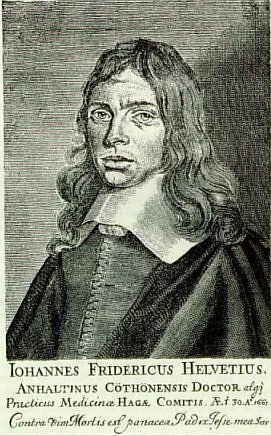Johann Friedrich Schweitzer
Johann Friedrich Schweitzer (1625–1709), also known by his Latinized name Henricus Meibomius Secundus, was a notable figure in the 17th century, primarily recognized for his contributions to the field of medicine and alchemy. Born in the Netherlands, Schweitzer was a physician who gained prominence through his medical practice and scholarly works.
Schweitzer's most significant contribution to medicine was his research and writings on chemistry and alchemy, which were prevalent fields of study among physicians of his time. He was a contemporary of other renowned scholars like Paracelsus and built upon the latter's work, focusing on the use of chemical substances in treating diseases. His approach to medicine was innovative for his era, emphasizing the importance of chemical reactions in the human body and the potential of chemical compounds as remedies.
In addition to his medical practice, Johann Friedrich Schweitzer is also remembered for his alleged discovery of the Philosopher's Stone, a legendary alchemical substance said to enable the transmutation of base metals into gold and possibly grant eternal life. This claim, detailed in a letter to the famous German polymath Gottfried Wilhelm Leibniz, has been met with skepticism but adds to the mystique surrounding Schweitzer's figure in the history of science and alchemy.
Schweitzer's work in the field of alchemy, while not universally accepted, played a role in the early development of chemistry as a scientific discipline. His efforts to understand and manipulate chemical substances laid the groundwork for future generations of scientists and chemists, bridging the gap between the mystical aspects of alchemy and the empirical approach of modern chemistry.
Throughout his life, Johann Friedrich Schweitzer published several works on medicine and alchemy, contributing to the scientific discourse of his time. His writings, although not as widely known today, provide valuable insights into the transitional period between alchemy and chemistry and the evolution of medical practices in the 17th century.
Schweitzer's legacy is that of a pioneering physician and alchemist whose work exemplifies the quest for knowledge and the application of scientific principles in medicine during a time of great change and discovery in Europe. His contributions, though overshadowed by more prominent figures of his era, remain an important part of the history of medicine and science.
Search WikiMD
Ad.Tired of being Overweight? Try W8MD's physician weight loss program.
Semaglutide (Ozempic / Wegovy and Tirzepatide (Mounjaro / Zepbound) available.
Advertise on WikiMD
|
WikiMD's Wellness Encyclopedia |
| Let Food Be Thy Medicine Medicine Thy Food - Hippocrates |
Translate this page: - East Asian
中文,
日本,
한국어,
South Asian
हिन्दी,
தமிழ்,
తెలుగు,
Urdu,
ಕನ್ನಡ,
Southeast Asian
Indonesian,
Vietnamese,
Thai,
မြန်မာဘာသာ,
বাংলা
European
español,
Deutsch,
français,
Greek,
português do Brasil,
polski,
română,
русский,
Nederlands,
norsk,
svenska,
suomi,
Italian
Middle Eastern & African
عربى,
Turkish,
Persian,
Hebrew,
Afrikaans,
isiZulu,
Kiswahili,
Other
Bulgarian,
Hungarian,
Czech,
Swedish,
മലയാളം,
मराठी,
ਪੰਜਾਬੀ,
ગુજરાતી,
Portuguese,
Ukrainian
Medical Disclaimer: WikiMD is not a substitute for professional medical advice. The information on WikiMD is provided as an information resource only, may be incorrect, outdated or misleading, and is not to be used or relied on for any diagnostic or treatment purposes. Please consult your health care provider before making any healthcare decisions or for guidance about a specific medical condition. WikiMD expressly disclaims responsibility, and shall have no liability, for any damages, loss, injury, or liability whatsoever suffered as a result of your reliance on the information contained in this site. By visiting this site you agree to the foregoing terms and conditions, which may from time to time be changed or supplemented by WikiMD. If you do not agree to the foregoing terms and conditions, you should not enter or use this site. See full disclaimer.
Credits:Most images are courtesy of Wikimedia commons, and templates, categories Wikipedia, licensed under CC BY SA or similar.
Contributors: Prab R. Tumpati, MD


